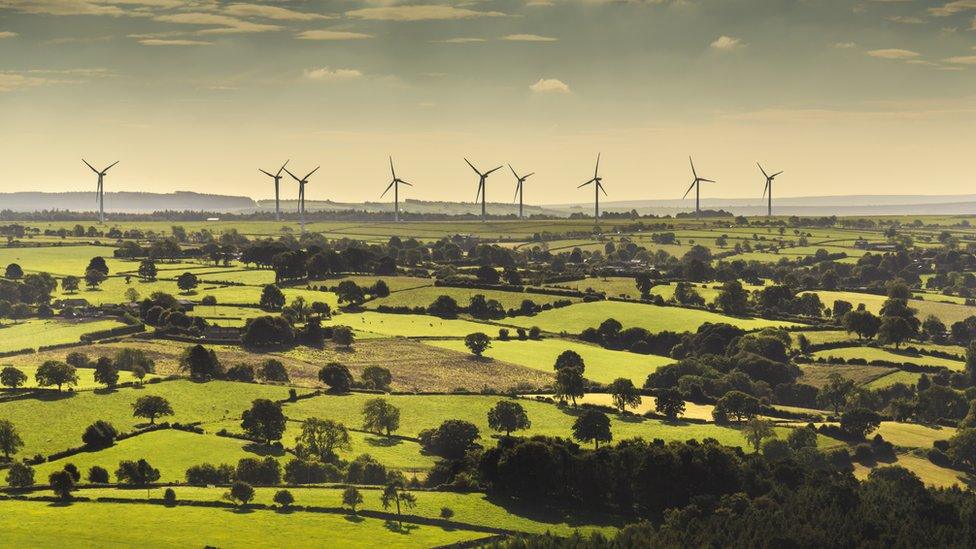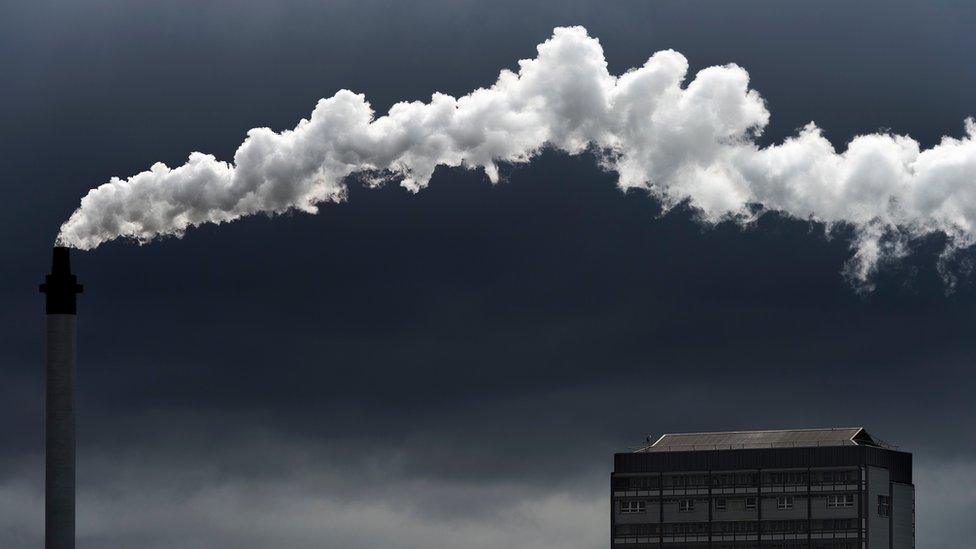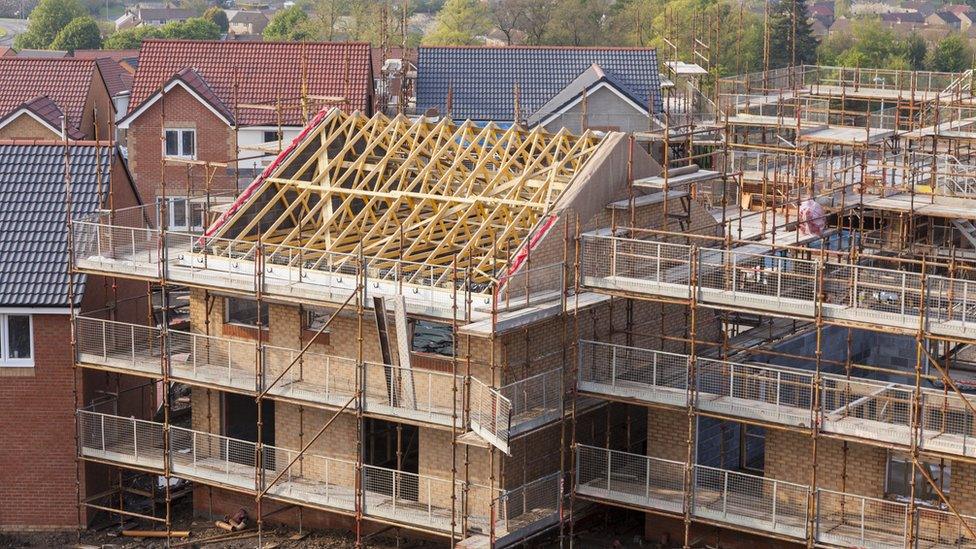Climate change: UK government 'like Dad's Army'
- Published
- comments

Renewables may be booming but the Committee on Climate Change says the government isn't moving fast enough
The UK has been dealt a "brutal reality check" on its climate change ambitions, environmentalists have said.
The government's official climate change advisers warn ministers are failing to cut emissions fast enough, and adapt to rising temperatures.
Committee on Climate Change, external chair John Gummer likened them to the hapless characters in 1970s comedy Dad's Army.
The government said it would soon set out plans to tackle emissions from aviation, heat, energy and transport.
The prime minister recently announced that the UK would lead the world by cutting almost all greenhouse gas emissions by 2050 - so-called net zero.
Theresa May also aspired to the UK hosting a hugely important global climate summit next year.
But the CCC said that the UK was already stumbling over measures needed to achieve the previous target of an 80% emissions cut.
Its report says new policies must be found to help people lead good lives without fuelling global warming.
How to reduce your carbon footprint when you fly
Policies are needed to ensure that people living in care homes, hospitals and flats can stay cool in increasingly hot summers.
And ministers must show how funds will be found to protect critical infrastructure - like ports - from rising sea levels.
The committee said unless it delivered on these issues, the government would not have the credibility to host a global climate change summit of world leaders, likely to be held in the UK next year.
Doug Parr from Greenpeace UK said: "This is a truly brutal reality check on the government's current progress in tackling the climate emergency.
"It paints the government as a sleeper who's woken up, seen the house is on fire, raised the alarm and gone straight back to sleep".
The committee's deputy chairwoman Baroness Brown told BBC News: "There's an increasing sense of frustration that the government knows what it has to do - but it's just not doing it."
The committee said the government's 2040 goal to eliminate emissions from cars and vans was too late.
New ways must be found to nudge some drivers into walking, cycling and taking public transport, it believes.
Climate change: Why are governments taking so long to take action?
There's palpable annoyance from the committee that their recommendations are often ignored.
In the list of actions needed to meet emission targets, such as improving insulation of buildings and increasing the market share of electric vehicles, the committee found only seven out of 24 goals were on track.
Outside the power and industry sectors, only two indicators were on track.
Committee chairman Lord Deben, the former agriculture minister John Gummer, said: "The whole thing is really run by the government like a Dad's Army. We can't go on with this ramshackle system."
UK going backwards?
At current rates of global emissions cuts, the world may be heading for a temperature rise of more than 3C by the end of this century - but the report says England appears unprepared for even a 2C rise in global temperature.
It warns that the UK is failing to insulate itself from the knock-on effects of climate change overseas, such as colonisations by new species, changes in the suitability of land for agriculture or forestry, and risks to health from changes in air quality driven by rising temperatures.

The report says: "Last June, we advised that 25 headline policy actions were needed for the year ahead. Twelve months later, only one has been delivered by the government in full."
It complains that in some ways the UK is going backwards.
Green space in parks and gardens cools cities and helps reduce flood risks. But as more homes are crammed into cities, green spaces have shrunk from 63% of urban area in 2001 to 55% in 2018.
Heat magnifies the production of pollutants, so more people are expected to suffer breathing problems.
Meanwhile, the proportion of hard surfaces in towns has risen by 22% since 2001, even though they make floods worse.
The report says the government's planning should consider the risks that the world may warm by as much as 4C by 2100.
Climate change: How 1.5C could change the world
It warns that the new net zero target requires an annual rate of emissions reduction that is 50% higher than under the UK's previous target.
It is 30% higher than what's been achieved on average since 1990 - a period when the UK has benefited from a relatively simple switch from coal to gas for electricity.
The report says: "The need for action has rarely been clearer. Our message to government is simple: 'Now, do it.'"

As new homes have been built green spaces have shrunk in urban areas over the past 20 years
A government spokesman said the UK had cut emissions faster than any other G7 country and set a strong example for other countries to follow.
"We know there is more to do - and legislating for net zero will help to drive further action, as well as further measures to protect the environment from extreme weather, including flood protection, tree planting and peat-land management," the spokesman added.
Shadow business and energy secretary Rebecca Long Bailey said the government efforts were lagging far behind what is required.
She said the report was a "remarkable, damning assessment".
Friends of the Earth's Mike Childs said: "Theresa May keeps talking about the need for climate action, while giving the green light to fracking and more roads and runways.
"Reining in the rogue Department for Transport is crucial. Billions of pounds are being squandered on gas-guzzling developments, while trams, trains, buses and cycling are starved of investment."
Climate change policy is devolved. Scotland faces slightly tougher targets for emissions cuts than England, and Wales faces a slightly more lax target. Northern Ireland polices are not yet determined.
Follow Roger on Twitter @rharrabin, external